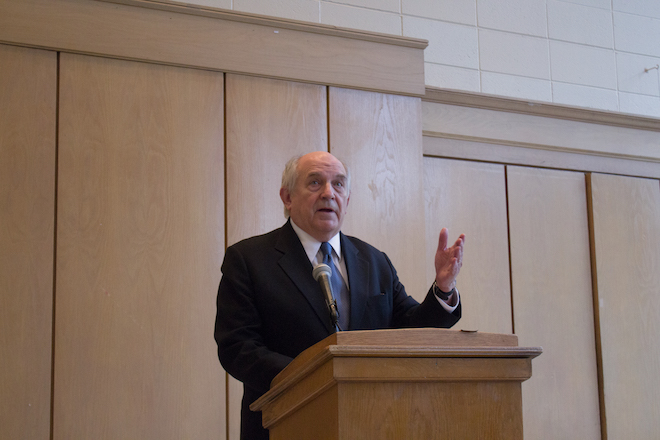College Republicans hosted political scientist Charles Murray on Wednesday. Murray is infamous for his book, The Bell Curve, co-authored by psychologist Richard Herrnstein, in which he argues intelligence as a primary indicator of social and economic prosperity, and writes that “it seems highly likely...that both genes and the environment have something to do with racial differences [in intelligence].”
Many prominent voices have condemned Murray's work. The Southern Poverty Law Center, a civil rights advocacy organization, labels Murray a white nationalist. Its website reads "Charles Murray...has become one of the most influential social scientists in America, using racist pseudoscience and misleading statistics to argue that social inequality is caused by the genetic inferiority of the black and Latino communities, women and the poor."
NUCR acknowledged this controversy with a disclaimer:
“The views invited to speak on campus are the views of the speaker, and not of Northwestern University,” said NUCR president David Donnelly. “Charles Murray is a visitor to this campus, and is entitled to speak without interruption.”
Similar sentiments have caused backlash at universities across the country, where Murray is often greeted by an onslaught of student protests. In March, Middlebury College spent weeks in national headlines after students there forcibly shut down an student group-sponsored lecture by Murray; Middlebury later took action against 67 students involved in the demonstration, some of whom allegedly shoved Murray and the event moderator.
At Northwestern, Murray students did not protest, though Parkes Hall was manned throughout the event by more than half a dozen police officers in addition to a number of security guards.
In his speech, Murray focused not on the topic of race and intelligence, but rather, on white working-class identity and the rise of Donald Trump. Murray, who refers to himself as a “never Trump-er” and has been critical of Donald Trump, credits Trump’s electoral victory in large part with what he sees as the devaluing of white men’s role in society over the past 50 years, as well as an increased in focus on identity politics.
“It’s really been going on since the 1980s - identity politics, particularly involving women and involving minorities,” Murray said, “whereby you have women’s studies programs, you have ethnic studies programs, you have a variety of ways in which people are encouraged to think of themselves as primarily defined by race, gender [and] social class.”
In response to the intensification of race and gender based identity politics in Americans life, which he calls “toxic”, Murray believes that white men have gravitated to an identity politics of their own, in the form of alt-right and white nationalist movements exemplified by figures such as Richard Spencer.
Additionally, Murray claimed that the rise of white identity politics results from the devaluing of men’s role in American life, dating back to the sexual revolution and the advent of the birth control pill. He cited decreasing life expectancy and increased rates of depression and substance abuse as evidence of “demoralization” of white men in society, stating that “white men are the only ethnic (sic) group in this county whose life expectancy has gone down during the 21st century.”
While life expectancy for white people has declined in recent years, they are still expected to live 3.4 years longer than Black people.
After concluding his remarks, Murray opened the floor for questions, at which point several students challenged his assertions about race, gender, and social roles. One student challenged his theory that contemporary white identity politics arose as a reaction to identity politics surrounding people of color and women, pointing out that white supremacist groups such as the KKK have existed since the founding of the United States. Another student criticized what she called Murray’s “infatuation with the tradition that American has of prioritizing the white men over all else”.
“I think that everything he’s saying is founded in really problematic statistics," said Weinberg freshman Janelle Yanez, who attended the event. “It’s interesting to me because he’s a sociologist, and I’m taking a sociology class right now, and everything we’re learning is not what he’s saying.”
“Our objective was to bring in a very well known and esteemed political scientist to talk about what we see as one of those miraculous happenings in politics in the last several decades, in Trump winning,” Donnelly said. “In general, we bring speakers who we think are going to create a very interesting conversation on campus, and we think that happened here.
